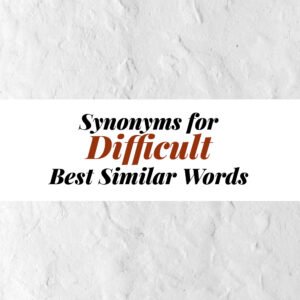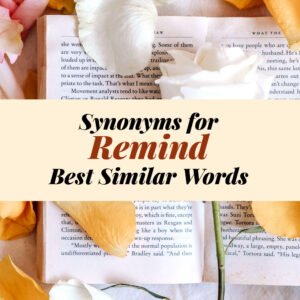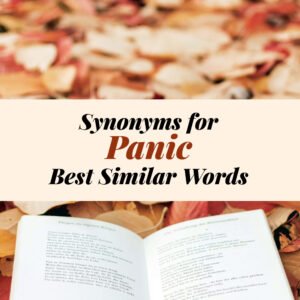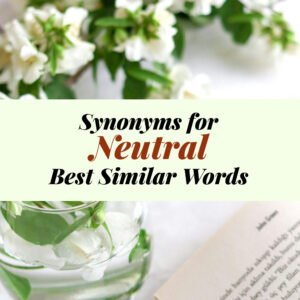When you want to talk about focus, it is helpful to know many other words that mean the same thing. Focus can mean paying attention, concentrating, or giving energy to one thing. Some common synonyms include concentration, attention, emphasis, and direction. Knowing these words helps you write better sentences and speak with more variety. In this article, we will explore 15 different focus synonyms with their meanings and examples, so you can use them correctly in different situations.
| Synonym | Meaning | Example |
|---|---|---|
| Concentration | Paying close attention to one thing | She needed full concentration to solve the puzzle. |
| Attention | Notice or awareness given to something | Please give your full attention to the teacher. |
| Emphasis | Special importance on something | The teacher put emphasis on practicing every day. |
| Direction | Guidance or focus toward a goal | He gave clear direction for completing the project. |
| Spotlight | Special focus or attention on someone | The actor was under the spotlight during the interview. |
| Priority | Something more important than other things | Health should always be a priority. |
| Target | The goal you want to reach | The team set a target to finish the work by Friday. |
| Center | The main point or area of attention | The discussion was at the center of the meeting. |
| Fixation | Strong attention to one idea or thing | His fixation on video games affected his studies. |
| Observation | Careful watching or noticing | Her observation helped solve the problem quickly. |
| Absorption | Complete attention or involvement | He read the book with full absorption. |
| Immersion | Being fully involved in an activity | Immersion in painting made her forget time. |
| Spotlighting | Highlighting or giving attention to | The manager was spotlighting new team members. |
| Concentrating | Actively giving attention | Concentrating on reading helped him understand better. |
| Attentiveness | Being alert and noticing details | Her attentiveness during the meeting impressed everyone. |
15 Different Ways to Say FOCUS: Another Word for FOCUS
Concentration
Concentration is when you give all your attention to one thing. It is about ignoring distractions and keeping your mind on the task. You can use concentration when studying, working, or practicing any skill. People need concentration to do difficult things because it helps them stay on track and finish work successfully. Concentration can also mean mental effort and careful thinking about one thing at a time. It is very helpful in school, at work, and in daily life. Practicing concentration can make learning faster and results better.
- She improved her concentration by studying in a quiet room.
- Meditation helps increase concentration and reduce stress.
- Concentration on driving makes the road safer.
Attention
Attention is the act of noticing something or giving focus to it. You can give attention to a person, task, or situation. It is important in learning, listening, and performing tasks. Paying attention helps you understand instructions and do things correctly. Attention can be small or large depending on what you need. It is also helpful in communication because people feel valued when you give them attention. You can train your attention by avoiding distractions and practicing mindfulness every day.
- Give attention to details to avoid mistakes.
- The baby needs constant attention from parents.
- Attention to instructions helps finish tasks correctly.
Emphasis
Emphasis is when you show that something is very important. It is like putting stress on a point or idea. Teachers use emphasis to make students notice key points. Writers use emphasis to make sentences stronger. Emphasis can also help in conversations to show what matters most. You can give emphasis by repeating words, speaking loudly, or using special signs in writing. It helps people understand what you think is important.
- The coach put emphasis on teamwork during practice.
- The article puts emphasis on protecting the environment.
- She gave emphasis to honesty in her speech.
Direction
Direction means guidance or instruction toward a goal. It helps you know what to do and where to go. People follow directions in school, work, and life. Having direction helps you stay organized and achieve goals. Without direction, tasks can feel confusing or slow. Leaders give direction to teams to help them finish projects. You can also give yourself direction by planning steps carefully and following them one by one.
- The teacher gave clear direction for the assignment.
- He followed the direction of the GPS to reach the city.
- Parents provide direction for their children’s activities.
Spotlight
Spotlight is when someone or something gets special attention. Being in the spotlight can make people notice your work or achievements. It is often used in media, performances, and awards. Spotlight can also mean highlighting an important idea in writing or speech. Using spotlight helps others see what matters most. People in the spotlight need to be careful because attention can be positive or negative.
- The actor was in the spotlight after the show.
- The new project was in the spotlight at the meeting.
- She enjoyed being in the spotlight during the ceremony.
Priority
Priority is something that is more important than other things. When you set a priority, you decide what to do first. Priorities help manage time and energy efficiently. Health, family, and work can be priorities depending on the situation. Knowing priorities makes life easier and helps avoid stress. You can list your priorities every day to focus on what matters most.
- Studying is my top priority this year.
- Health should always be a priority for everyone.
- The manager set safety as the first priority.
Target
Target is a goal or result you want to reach. It is something you aim at. Setting targets helps people focus on what they want. Targets can be small daily tasks or large long-term goals. When you know your target, you can plan steps to achieve it. Targets also give motivation and measurement of success. People often celebrate when they reach their targets because it shows effort worked.
- The team set a target to finish work by Friday.
- Her target is to read two books every month.
- He aimed at the target and scored perfectly.
Center
Center means the main point or area of attention. It is the place where everything focuses. Discussions, meetings, and ideas often have a center. Knowing the center helps you understand what is most important. Center can also mean the middle point in physical space. Being at the center of attention can be exciting or stressful. People use the word center to show importance and main focus in different situations.
- The project discussion was at the center of the meeting.
- The children played at the center of the park.
- Honesty is at the center of his beliefs.
Fixation
Fixation is when someone pays too much attention to one thing. It can be good if it helps achieve a goal, but too much fixation can be negative. People can have fixation on hobbies, work, or thoughts. Fixation shows strong interest but may also cause ignoring other things. It is important to balance fixation and other responsibilities. Understanding fixation helps control focus better and improve productivity.
- His fixation on video games affected his studies.
- She had a fixation on collecting stamps.
- Fixation on small details slowed down the project.
Observation
Observation is the act of carefully watching or noticing something. It helps gather information, learn, and make decisions. Observation is useful in studies, work, and daily life. People with good observation can see small details that others miss. It also helps in understanding behavior, nature, and situations. Observation can be practiced by being patient, watching carefully, and asking questions.
- Her observation helped solve the problem quickly.
- Scientists rely on observation for experiments.
- Observation of traffic rules prevents accidents.
Absorption
Absorption is being completely involved in an activity or thought. It means paying full attention and forgetting distractions. Absorption happens in reading, playing, or working. When absorbed, people can achieve better results because they are fully focused. Absorption can also mean learning deeply or enjoying something completely. Practicing absorption helps improve skills, knowledge, and creativity.
- He read the book with full absorption.
- Absorption in painting improved her technique.
- The student listened with absorption during class.
Immersion
Immersion is when you are fully involved in an activity. It helps people learn and enjoy better. Immersion can happen in work, learning, or hobbies. Being immersed means forgetting time and concentrating completely. It helps improve skills and memory. Immersion also brings satisfaction because you give full effort. Practicing immersion often leads to better results and deeper understanding.
- Immersion in painting made her forget time.
- Language learning improves with immersion.
- He experienced immersion in a new video game.
Spotlighting
Spotlighting means highlighting or giving special attention to something. It is used to make a person, idea, or project noticeable. Spotlighting helps people understand what is important. It can also be used in meetings, articles, or presentations. Spotlighting allows key points to stand out and get noticed by others. People use spotlighting to guide attention and emphasize value.
- The manager was spotlighting new team members.
- The article was spotlighting innovative ideas.
- Teachers are spotlighting students with good performance.
Concentrating
Concentrating is actively giving attention to one thing. It is about focusing and ignoring distractions. Concentrating helps finish tasks faster and with better results. It is important in studying, working, and learning skills. People who practice concentrating can achieve goals more efficiently. Concentrating also helps in remembering things and improving quality of work. It is a skill that can be improved by practice and patience.
- Concentrating on reading helped him understand better.
- She was concentrating during the math test.
- Concentrating on cooking improved her recipes.
Attentiveness
Attentiveness means being alert and noticing details. It helps in work, school, and relationships. Attentive people can respond quickly and avoid mistakes. Attentiveness shows care, respect, and focus. It is useful in communication and teamwork. Practicing attentiveness can improve learning, performance, and social skills. It also helps in avoiding problems and understanding situations better.
- Her attentiveness during the meeting impressed everyone.
- Attentiveness in class helps students succeed.
- Parents value attentiveness in children.
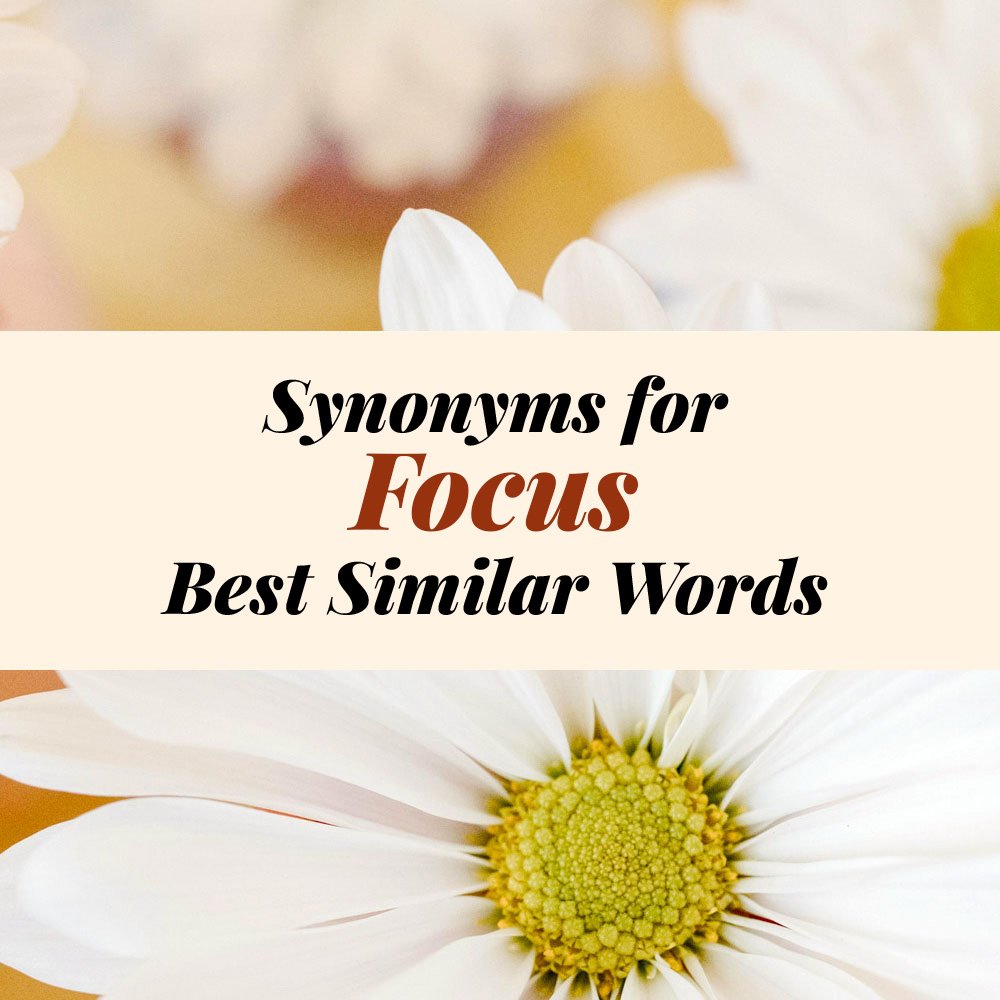
Final Thoughts
Focus can be expressed in many ways, like concentration, attention, or priority. Using these synonyms makes communication richer and clearer. Practicing these words in sentences can improve writing and speaking skills effectively.
